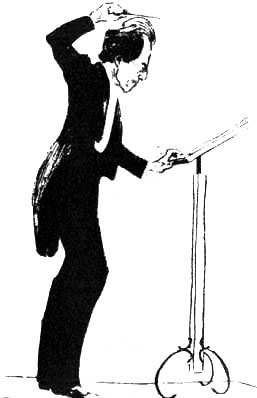“I am thrice homeless, as a native of Bohemia in Austria, as an Austrian among Germans, and as a Jew throughout the world. Everywhere an intruder, never welcomed.”
––– Gustav Mahler, recounted by his wife (Mahler 1946, 89)
The Wayfarer
The differences separating Mahler from the rest of mainstream society were not purely factors of ethnic line, but were also palpable. Not only was Mahler from Jewish stock, born in the hinterlands of the Empire, but he also had severe physical problems. The congential heart condition that would lead to his death plagued him throughout his entire life, at times causing fainting spells (Feder 2004, 104). Beyond that, Mahler was often described as "nervous," "swept in by the wind." Henri Louis de La Grange points out that Mahler never quite fit in: "he may have been Viennese at heart and by adoption, but he never became Viennese in character" (de La Grange 1973, 446). His worship of the arts bordered on the mystic or fanatical and clashed decidedly with Viennese culture.
Conducting criticism
 |
In fact, both his physical ailments and fanatical character played into anti-Semitic stereotypes of the time. K. M. Knittel notes that many critical descriptions of Mahler's manner on the podium--especially conductor's silhouettes--point to an outsider's identity. Notice the dynamism and even contortion the image to the left portrays, from Mahler's hair and hand, down to the legs of the conducting stand (Knittel 1995, 265). He cites a popular description of the Jewish body from around that time: “No aspect of the Jewish body…is free from the taint of the claim of the special nature of the Jewish body as a sign of the inherent difference of the Jew.” (Knittel 268) Mahler's conducting exemplified these "differences" by "jerking convulsively, digging for treasure, tracing the magic circle" and other alien habits (Blaukopf 1976, 136-7). It is not hard to see typical anti-Semitic slurs within descriptions like these: the Jew is weak, nervous, greedy, and mystical. Altogether different. |
Criticism of compositions
But Mahler's ill-fated reception did not stop at the podium. His music was often lambasted for its overly ornamental quality. Many cited a lack of structure in his works, while other decried their sensationalist nature (Painter 2002, 237). In his music they heard an assault on tradition and decency and anyone who enjoyed it was labeled, like Mahler, a Jew.